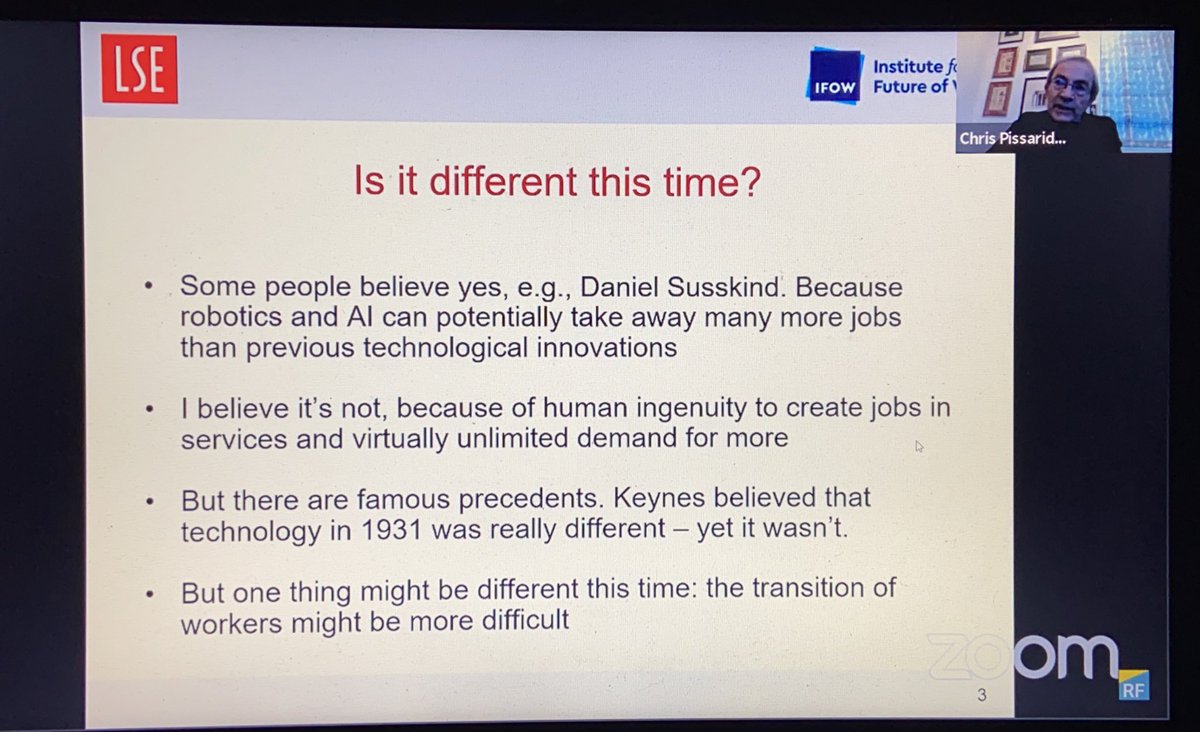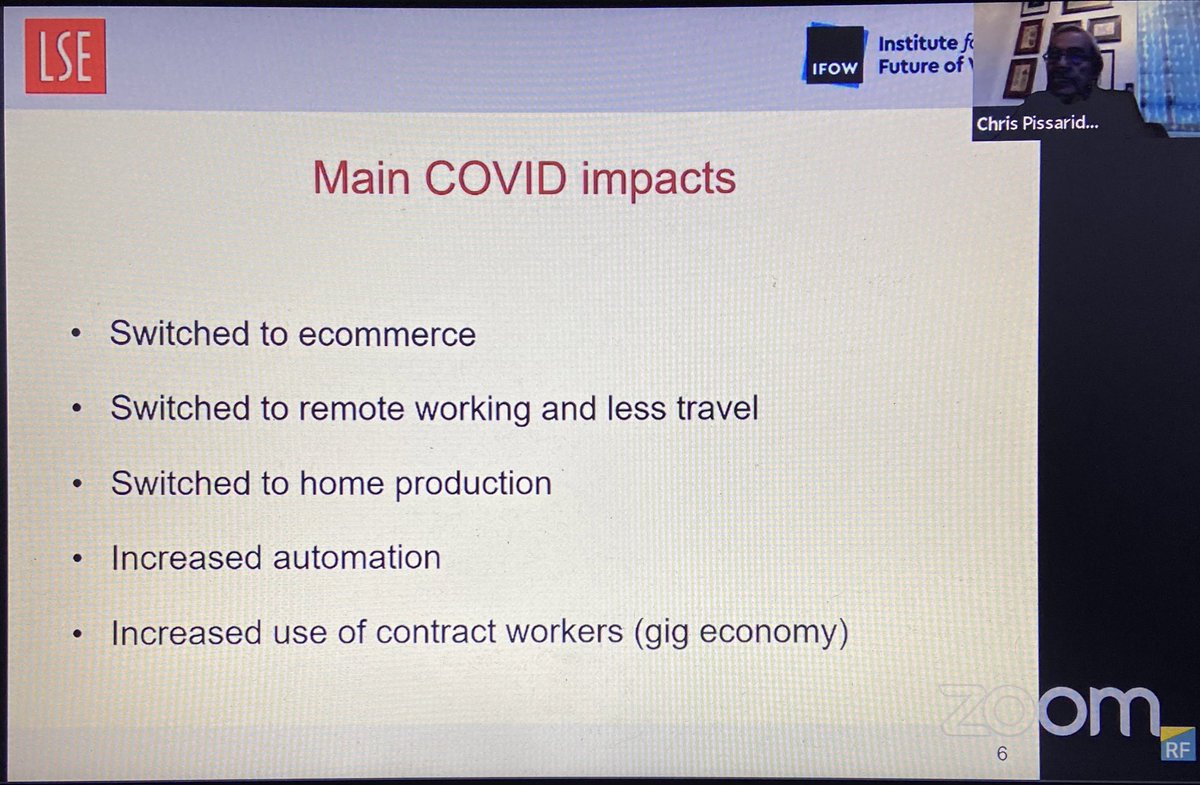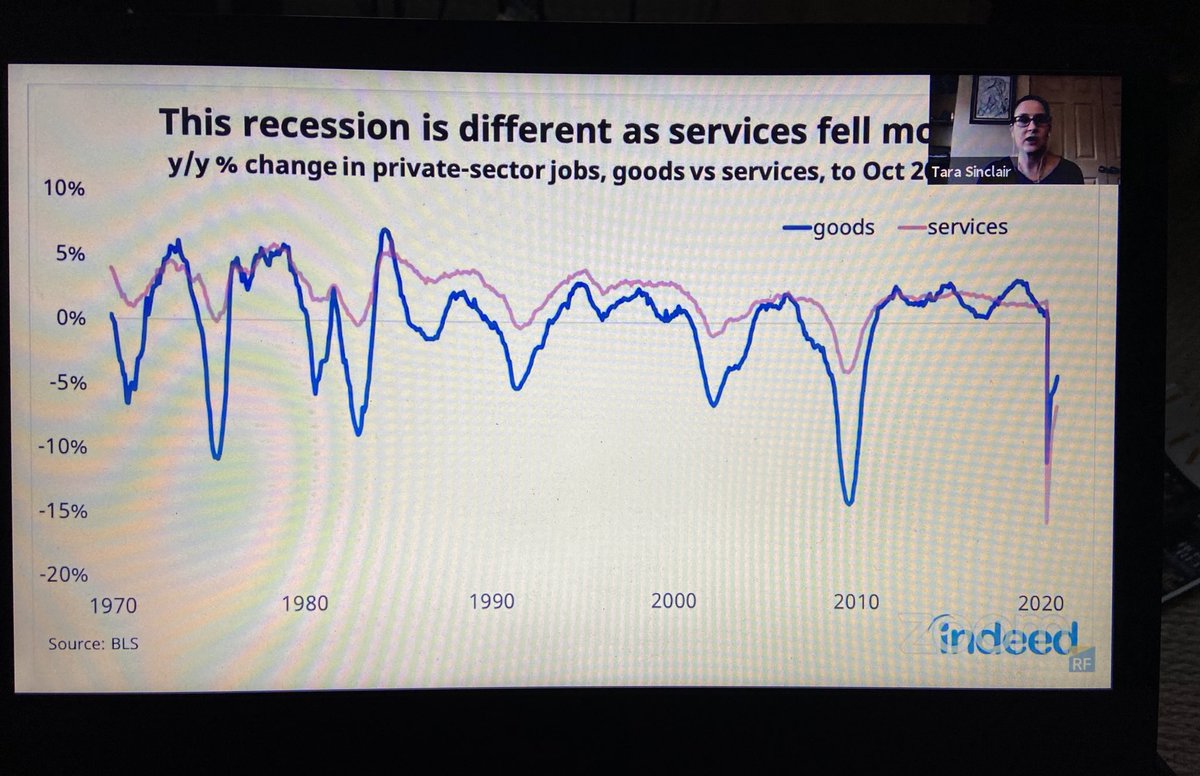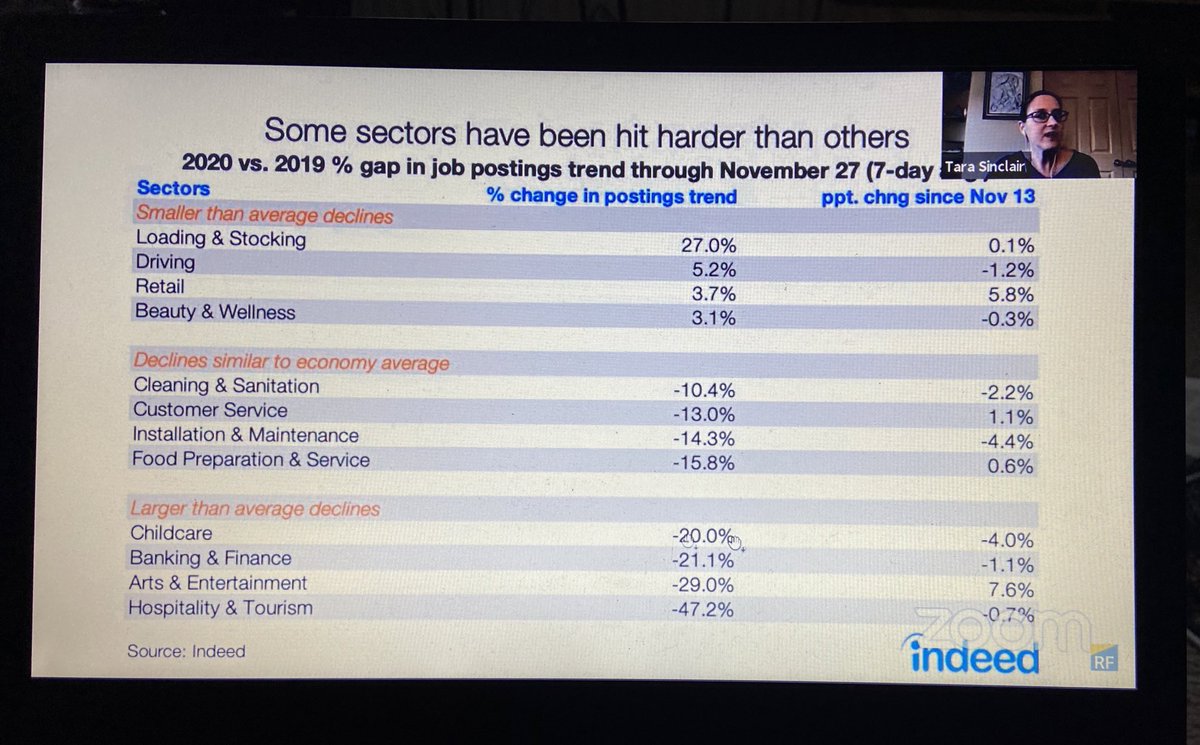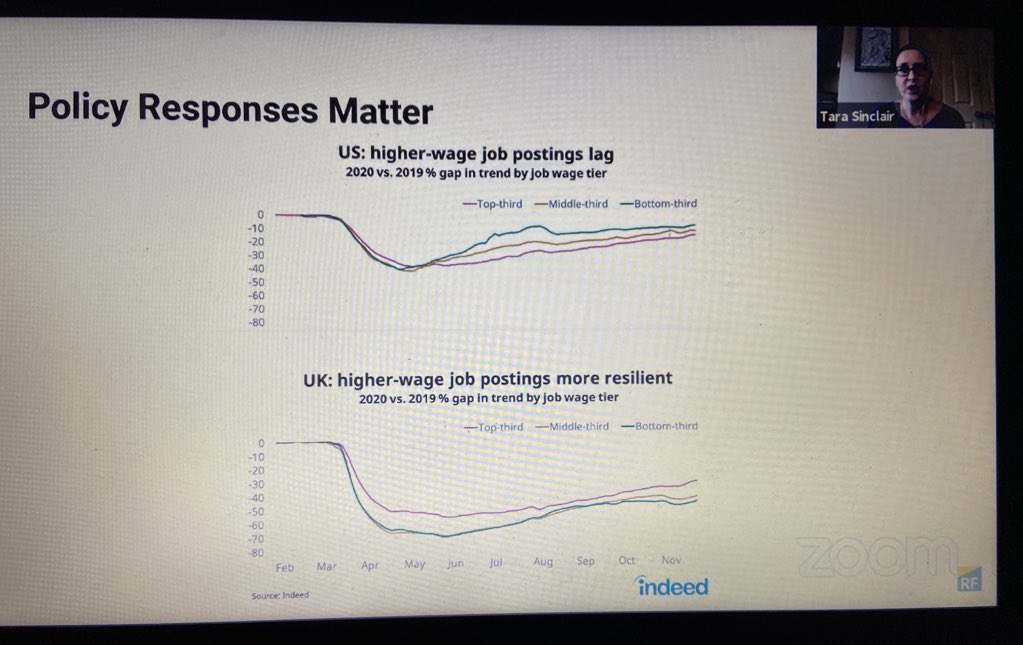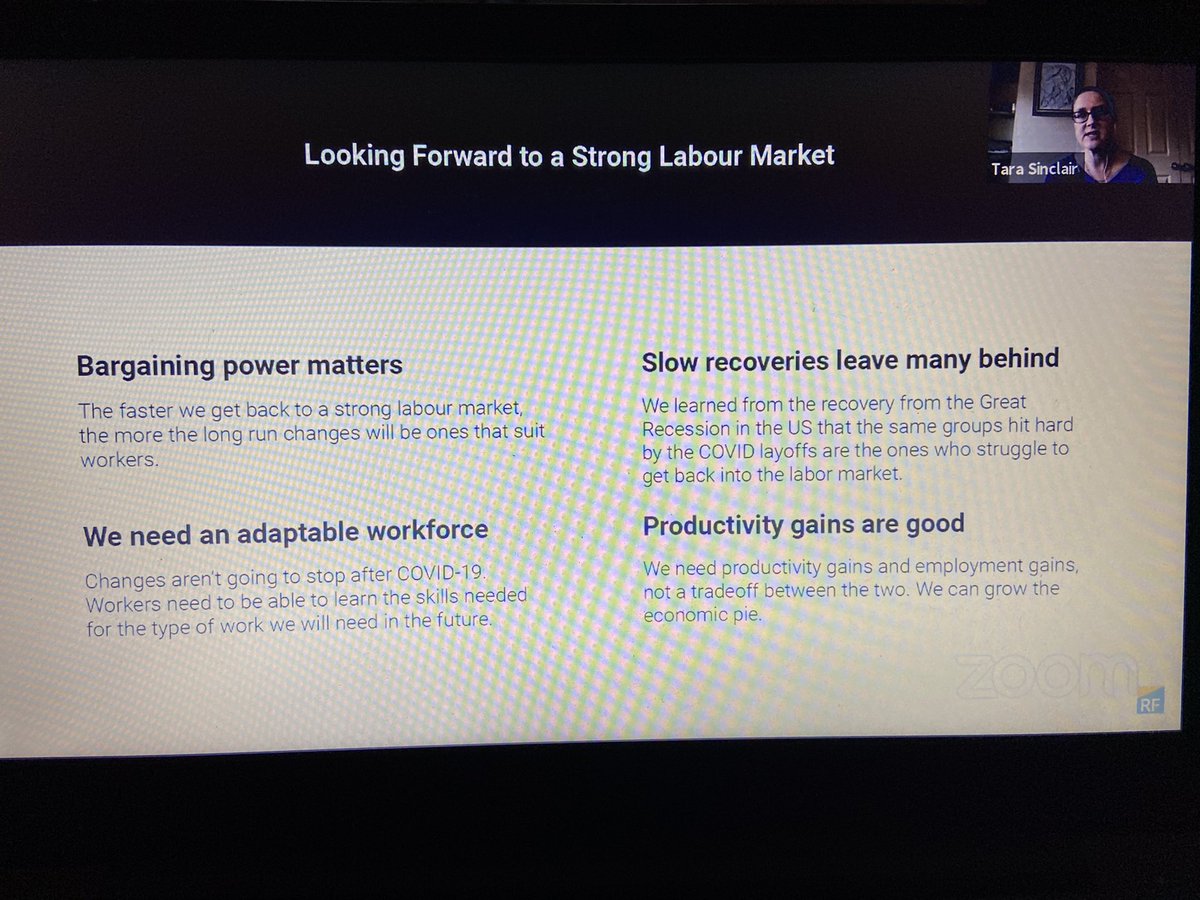Looking forward to hearing more about what can be done to address the challenges and opportunities arising from the unequal impact #Coronavirus has had on the labour markets #Coronanomics https://twitter.com/resfoundation/status/1335939619725004801
Chair Simon Price opens the webinar by reminding delegates that the #Coronavirus pandemic has seen a historic drop in #productivity in the  & significantly altered how we both earn and spend our money #Coronanomics
& significantly altered how we both earn and spend our money #Coronanomics
 & significantly altered how we both earn and spend our money #Coronanomics
& significantly altered how we both earn and spend our money #Coronanomics
Price says this means the #Coronavirus recession will have a different impact to previous recessions: Will alter not just how the economy, but also significantly change many social aspects of our society #Coronanomics
First, Sir Chris Pissarides discusses how #Coronavirus has impacted the automation process in various industries, & where workers in these automated jobs are moving on to #Coronanomics
Pissarides reminds delegates that automation was the biggest challenge facing labour markets before the #coronavirus pandemic. Rewards of automation were not always evenly spread, however labour markets historically had coped with the structural changes #Coronanomics
Is the #coronavirus recession different? Pissarides says he does not believe  s & AI will replace as many jobs as, say, electrification - however the transition of workers may be more difficult this time #Coronanomics
s & AI will replace as many jobs as, say, electrification - however the transition of workers may be more difficult this time #Coronanomics
 s & AI will replace as many jobs as, say, electrification - however the transition of workers may be more difficult this time #Coronanomics
s & AI will replace as many jobs as, say, electrification - however the transition of workers may be more difficult this time #Coronanomics
Pissarides says that, in the short-term, lockdowns & social distancing have made it more difficult to find work #Coronanomics
Pissarides believes that the #coronavirus pandemic has “changed the dynamics of structural change” forever & led to significant societal shifts. Lists the five key areas in personal behavour that he believes will have irrevocably changed #Coronanomics
Looking at structural change, Pissarides says that automation has accelerated under the #coronavirus pandemic, meaning job destruction rates are higher than previous pandemics. Meanwhile, job creation is lower, especially in services involving 1-2-1 contact #Coronanomics
However, some areas are seeing expansion in jobs, with Pissarides highlighting #SocialCare and gig economy jobs such as delivery. However, this is not moving fast enough to replace all lost jobs #Coronanomics
Pissarides says that we will not see a reversal of automation following the #coronavirus pandemic. Says govt & businesses need to focus on job creation & availability of good quality jobs #Coronanomics
Pissarides also predicts that we will not see a significant return to jobs that involve high levels of personal contact (due to habits formed in lockdown), but also a high increase in contract/gig jobs #Coronanomics
Post- #Coronavirus Pissarides also predicts a fall in business travel; as companies begin to utilise online meeting tools. However, Pissarides predicts that the increase in home production & drop in leisure activities seen in the pandemic will reverse #Coronanomics
Looking at the government’s role, Pissarides says that Health & #socialcare will see the biggest increase in job creation & #STEM skills will become the most valuable. However, UK historically weak at helping children gain STEM skills at  #Coronanomics
#Coronanomics
 #Coronanomics
#Coronanomics
For companies, Pissarides says that the provision of #training needs to be owned by businesses to help workforce meet changing skills needs. In the gig economy Pissarides says more needs to be done to improve career progression & how to deal with “moonlighting” #Coronanomics
Looking at working arrangements, Pissarides notes that urban unemployment pre- #Coronavirus has been mostly unchanged for many years: People worked in an office or shop and travelled to work #Coronanomics
Post- #Coronavirus, Pissarides believes that hybrid working will become the new normal. There will be an increase in use of internet technologies for meetings, leading to a “blurring” of residential & commercial neighbourhoods #Coronanomics
As distinctions between neighbourhoods begin to blur, Pissarides says jobs that support offices (eg restaurants, taxis, maintenance) will quickly need to adapt #Coronanomics
#WorkingFromHome will lead to the necessity for good IT skills. Pissarides notes that these jobs tend to be professional & more highly paid. This will lead to an increase in inequality & the digital divide #Coronanomics
Next, @TaraSinc starts her presentation looking at the  perspective & re-emphasises that “this recession *IS* different” - largely in part due to the novel responses to the #Coronavirus leading to the recessions, rather than policy choices #Coronanomics
perspective & re-emphasises that “this recession *IS* different” - largely in part due to the novel responses to the #Coronavirus leading to the recessions, rather than policy choices #Coronanomics
 perspective & re-emphasises that “this recession *IS* different” - largely in part due to the novel responses to the #Coronavirus leading to the recessions, rather than policy choices #Coronanomics
perspective & re-emphasises that “this recession *IS* different” - largely in part due to the novel responses to the #Coronavirus leading to the recessions, rather than policy choices #Coronanomics
Sinclair calls this recession “the first services recession”, with industries that had usually seen as largely recession-proof now also being negatively impacted by the #coronavirus pandemic #Coronanomics
Sinclair also notes that policy responses have mattered in terms of the impact #Coronavirus has had on the labour market. Compares & contrasts  furlough scheme with
furlough scheme with  policy response #Coronanomics
policy response #Coronanomics
 furlough scheme with
furlough scheme with  policy response #Coronanomics
policy response #Coronanomics
Sinclair says that the  experienced a “mom-cession”, where women with childcare responsibilities were more likely to loose their jobs & less likely to re-enter the workforce due to childcare. IMF research shows “
experienced a “mom-cession”, where women with childcare responsibilities were more likely to loose their jobs & less likely to re-enter the workforce due to childcare. IMF research shows “ -heavy industries” were seeing higher job losses #Coronanomics
-heavy industries” were seeing higher job losses #Coronanomics
 experienced a “mom-cession”, where women with childcare responsibilities were more likely to loose their jobs & less likely to re-enter the workforce due to childcare. IMF research shows “
experienced a “mom-cession”, where women with childcare responsibilities were more likely to loose their jobs & less likely to re-enter the workforce due to childcare. IMF research shows “ -heavy industries” were seeing higher job losses #Coronanomics
-heavy industries” were seeing higher job losses #Coronanomics
Looking to the future, Sinclair says that flexible working will be likely to increase post- #Coronavirus. However, Sinclair also predicts the power dynamics of these discussions will change; with employees calling for better conditions, not employers setting terms #Coronanomics
Sinclair agrees with Pissarides that automation will continue apace post- #Coronavirus. However, this may also slow down the economic recovery as displacement of jobs leading to weaker labour markets & ∴ slower adoption of labour-displacing technologies #Coronanomics
Sinclair concludes saying that post- #Coronavirus could lead to a stronger, more equitable labour market. Believes bargaining powers will increase & workers will become more adaptable & frequently re/upskill to respond to changing demand for skills #Coronanomics
Moving on to Q&A, speakers are asked about the impact of post- #Coronavirus on working patterns will have on transport networks LD. Pissarides says current business travel is about getting people into city centres; poor infrastructure for moving around the periphery #Coronanomics
Pissarides says this will lead to significant investment in infrastructure “in the next five years”. Vehicle electrification will also have a significant impact on urban & suburban infrastructure as  stations close & charging points needed #Coronanomics
stations close & charging points needed #Coronanomics
 stations close & charging points needed #Coronanomics
stations close & charging points needed #Coronanomics
Sinclair notes that, for example, Metro infrastructure takes at least 10 years & recession will have an impact on #LocalGov budgets. Believes we will see a repurposing of spaces (eg offices) around existing infrastructure, rather than the creation of new routes #Coronanomics
Moving on to how the perception of key workers has changed during the #Coronavirus pandemic, Pissarides says NHS & #SocialCare workers were the most celebrated. However, as public workers higher wages would mean higher taxes, which majority of people don’t support #Coronanomics
Pissarides suggests a more detailed breakdown of where tax money goes; highlighting what % goes to key workers, may garner more support for higher wages for public sector workers #Coronanomics
Sinclair agrees. Notes that #SocialCare will see the biggest demand for jobs as we are an ageing population. However, unless pay & benefits increase, these jobs will remain undesirable & uncompetitive #Coronanomics

 Read on Twitter
Read on Twitter